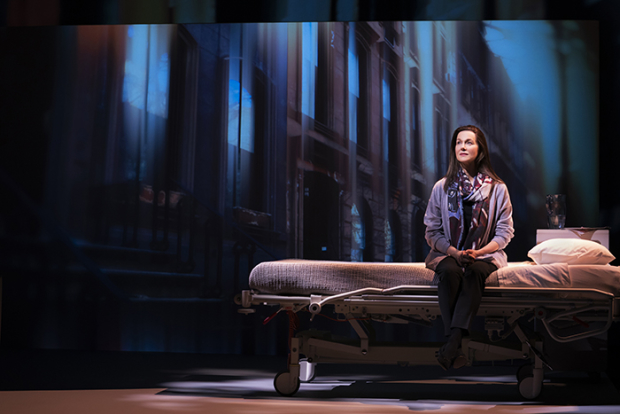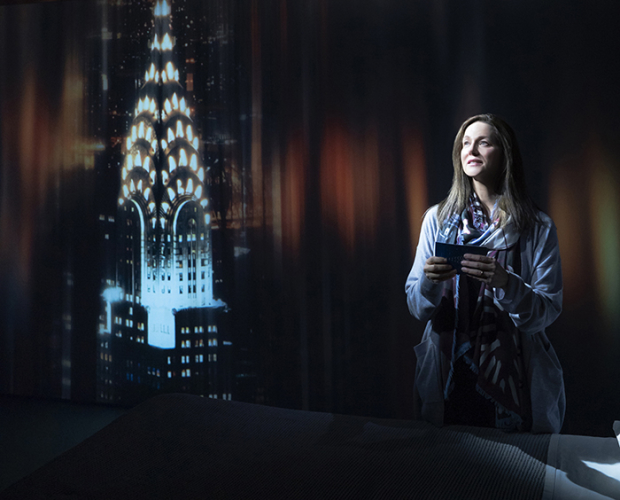Laura Linney Is All Alone in My Name Is Lucy Barton
Linney brings the solo stage adaptation of Elizabeth Strout’s novel from London to Broadway at Manhattan Theatre Club’s Samuel J. Friedman Theatre.

(© Matthew Murphy)
Laura Linney is the second powerhouse actor this season to hold court before a Broadway audience and expound upon the potency of a well-told story.
Studio 54 recently parted ways with Adam Rapp's The Sound Inside, which starred Mary-Louise Parker as a Yale writing professor who weaves her battle with terminal illness and budding friendship with a student into an award-worthy piece of literature before our eyes. My Name Is Lucy Barton, adapted by Rona Munro from Elizabeth Strout's 2016 novel, strikes similar, though altogether less resounding, chords at Manhattan Theatre Club's Samuel J. Friedman Theatre where our title character, also a writer, cobbles together pieces of her personal and family history to tell her "one story" from the remembered confines of a hospital room.
One story, according to a writer Lucy talks about admiringly, is all anyone really has in them. They simply have to find new ways to tell it over and over again…and they better tell it "ruthlessly." While the story told by Parker as The Sound Inside's Professor Bella Baird seemed to be one about finding connection through the haze of crushing loneliness, Linney, as the Illinois-born-and-bred Lucy, seems to be confirming humanity's perpetual state of isolation. Perhaps that explains why she (unlike Parker, who shared the stage with the talented Will Hochman) has been given the challenge of holding the stage alone as both Lucy and her caustic mother, who appears at her bedside during Lucy's nine-week hospital stay after an appendectomy gone wrong.
The visit is a surprise, seeing as Lucy's mother has never taken the plane ride from Amgash, Illinois, to New York City (or any plane ride, for that matter), nor has she ever expressed much maternal warmth toward Lucy in any form whatsoever. The hospital setting, of course, does not inspire a miraculous transformation, so her time with her grown daughter is mostly spent recounting local gossip from Lucy's childhood, filtered through a harsh Chicago accent that sinks into familiar names like Kaaaathie Niiiicely (speaking of telling stories over and over again, Kathie Nicely may as well have been the star of her own nursery rhyme in the Barton household).

(© Matthew Murphy)
Lucy conspicuously does not share her mother's dialect — our first clue about the crux of her story. Raised in poverty with no television, magazines, books, or any other point of access to the outside world, Lucy's narrative is one of escape: escape from her confining childhood, escape from her parents' abusive behaviors, and escape from her ill-fitted identity as an unremarkable citizen of Amgash. But for Lucy, casting off one brand of loneliness only leads her to another, and the rejection of her roots — painful and isolating as they were themselves — leaves her untethered in new ways. Is that what happens when you toss out the cards dealt you? Or is claiming any identity always a "ruthless" act of sequestration?
Strout's story leaves you asking these rich and deeply personal questions, but the production does not unequivocally convince that My Name Is Lucy Barton fits as well onstage as it does on the page. As directed by Richard Eyre, the piece is rather monochromatic (despite lighting designer Peter Mumford and sound designer John Leonard's contributions to the tonal transitions) — the main element of staging being Linney's trips back and forth between the bed and the chair in Lucy's hospital room, which overlooks a projected window that occasionally switches from a New York street view to the open fields and sky of her youth (scenic design by Bob Crowley and video design by Luke Halls). The piece's anecdotes add up to more than the sum of their parts, but if your mind drifts away amidst the prose (as mine tended to do), there's no rereading that paragraph to see what you missed.
That brings us to Linney's performance. A four-time Tony-nominated stage veteran seen just two years ago on this exact stage in MTC's revival of The Little Foxes, she maneuvers with unflappable poise through the death-defying challenge that is a solo play. She almost makes it too easy to watch, letting us see Lucy shaken but never portentously so, giving us a glimpse of her mother's emotional weapons but never cutting us with them. The dysfunction is palpable for sure, but for My Name Is Lucy Barton to become a true theatrical magic trick, we need to feel that particular ache of loneliness that only hits when someone is standing right next to you.








